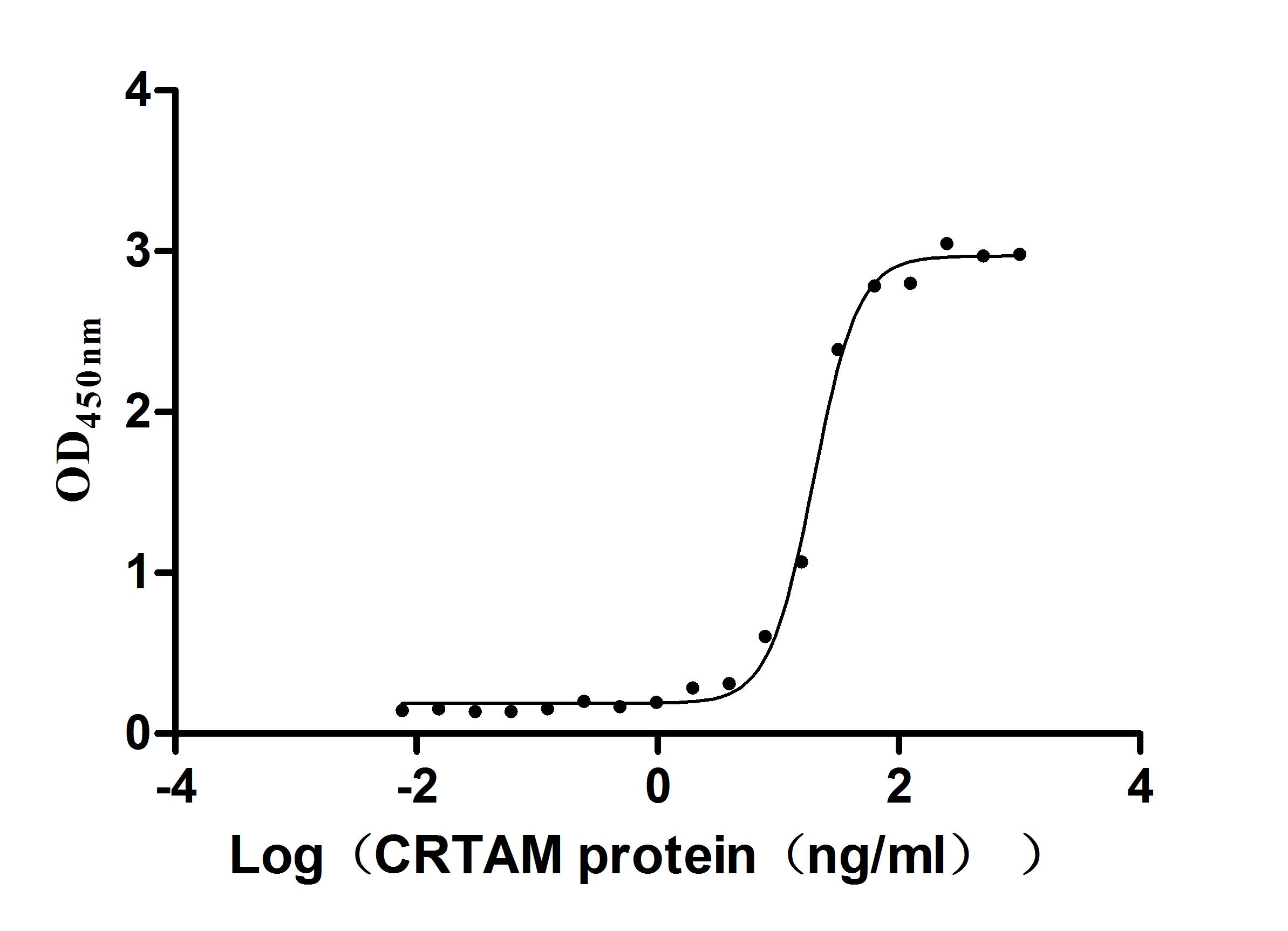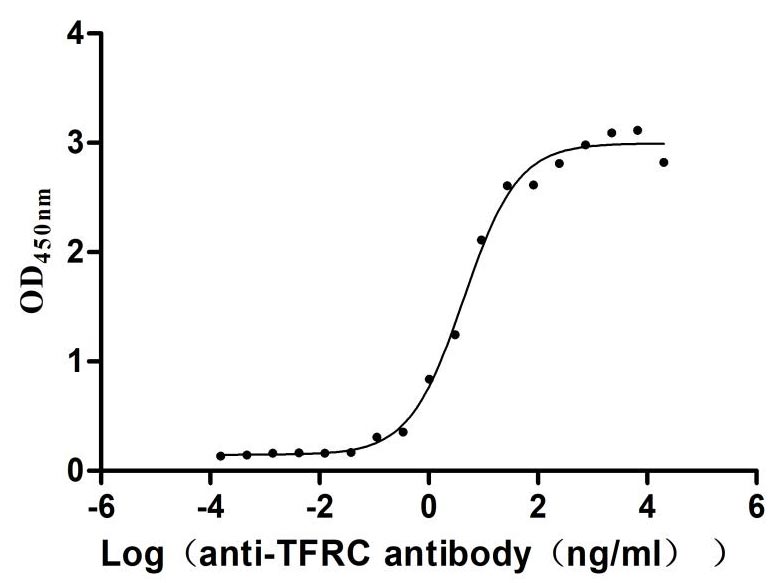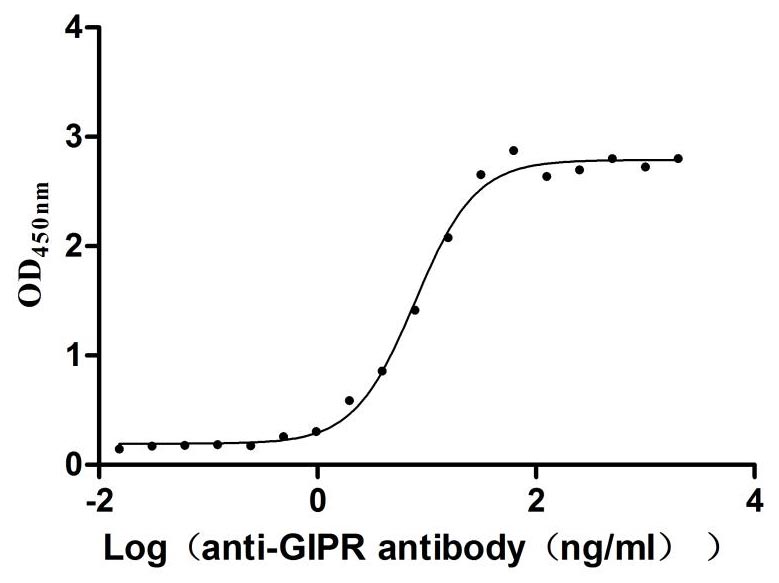Recombinant Human Cytokine-inducible SH2-containing protein (CISH)
-
货号:CSB-YP885721HU
-
规格:
-
来源:Yeast
-
其他:
-
货号:CSB-EP885721HU-B
-
规格:
-
来源:E.coli
-
共轭:Avi-tag Biotinylated
E. coli biotin ligase (BirA) is highly specific in covalently attaching biotin to the 15 amino acid AviTag peptide. This recombinant protein was biotinylated in vivo by AviTag-BirA technology, which method is BriA catalyzes amide linkage between the biotin and the specific lysine of the AviTag.
-
其他:
-
货号:CSB-BP885721HU
-
规格:
-
来源:Baculovirus
-
其他:
-
货号:CSB-MP885721HU
-
规格:
-
来源:Mammalian cell
-
其他:
产品详情
-
纯度:>85% (SDS-PAGE)
-
基因名:
-
Uniprot No.:
-
别名:BACTS2; cis 1; CIS; CIS-1; CIS1; Cish; CISH_HUMAN; Cytokine inducible inhibitor of signaling type 1B; Cytokine inducible SH2 containing protein; Cytokine-inducible SH2-containing protein; G18; Protein G18; SOCS; Suppressor of cytokine signaling
-
种属:Homo sapiens (Human)
-
蛋白长度:full length protein
-
表达区域:1-258
-
氨基酸序列MVLCVQGPRP LLAVERTGQR PLWAPSLELP KPVMQPLPAG AFLEEVAEGT PAQTESEPKV LDPEEDLLCI AKTFSYLRES GWYWGSITAS EARQHLQKMP EGTFLVRDST HPSYLFTLSV KTTRGPTNVR IEYADSSFRL DSNCLSRPRI LAFPDVVSLV QHYVASCTAD TRSDSPDPAP TPALPMPKED APSDPALPAP PPATAVHLKL VQPFVRRSSA RSLQHLCRLV INRLVADVDC LPLPRRMADY LRQYPFQL
-
蛋白标签:Tag type will be determined during the manufacturing process.
The tag type will be determined during production process. If you have specified tag type, please tell us and we will develop the specified tag preferentially. -
产品提供形式:Lyophilized powder
Note: We will preferentially ship the format that we have in stock, however, if you have any special requirement for the format, please remark your requirement when placing the order, we will prepare according to your demand. -
复溶:We recommend that this vial be briefly centrifuged prior to opening to bring the contents to the bottom. Please reconstitute protein in deionized sterile water to a concentration of 0.1-1.0 mg/mL.We recommend to add 5-50% of glycerol (final concentration) and aliquot for long-term storage at -20℃/-80℃. Our default final concentration of glycerol is 50%. Customers could use it as reference.
-
储存条件:Store at -20°C/-80°C upon receipt, aliquoting is necessary for mutiple use. Avoid repeated freeze-thaw cycles.
-
保质期:The shelf life is related to many factors, storage state, buffer ingredients, storage temperature and the stability of the protein itself.
Generally, the shelf life of liquid form is 6 months at -20°C/-80°C. The shelf life of lyophilized form is 12 months at -20°C/-80°C. -
货期:Delivery time may differ from different purchasing way or location, please kindly consult your local distributors for specific delivery time.Note: All of our proteins are default shipped with normal blue ice packs, if you request to ship with dry ice, please communicate with us in advance and extra fees will be charged.
-
注意事项:Repeated freezing and thawing is not recommended. Store working aliquots at 4°C for up to one week.
-
Datasheet :Please contact us to get it.
相关产品
靶点详情
-
功能:SOCS family proteins form part of a classical negative feedback system that regulates cytokine signal transduction. CIS is involved in the negative regulation of cytokines that signal through the JAK-STAT5 pathway such as erythropoietin, prolactin and interleukin 3 (IL3) receptor. Inhibits STAT5 trans-activation by suppressing its tyrosine phosphorylation. May be a substrate-recognition component of a SCF-like ECS (Elongin BC-CUL2/5-SOCS-box protein) E3 ubiquitin-protein ligase complex which mediates the ubiquitination and subsequent proteasomal degradation of target proteins.
-
基因功能参考文献:
- identified P2RX2, KCNQ5, ERBB3 and SOCS3 to be associated with the progression of age-related hearing impairment PMID: 29325454
- CIS interacted with phosphorylated EpoR at Y401, which was critical for the activation of STAT5 and ERK. PMID: 28038963
- Studies indicate that suppressors of cytokine signaling (SOCS) proteins CIS, SOCS1, and SOCS3 can be considered the third immunocheckpoint molecules since they regulate cytokine signals that control the polarization of CD4(+) T cells and the maturation of CD8(+) T cells. PMID: 28188673
- CISH rs414171 and rs6768300 variants might be associated with protection from pulmonary tuberculosis in Zahedan, Southeast Iran. PMID: 27266592
- This study showed that there was significantly increased levels of CIS mRNA in elderly and Alzheimer's disease brains. PMID: 25286386
- Data indicate that CIS protein stability is regulated through multiple mechanisms, including ubiquitination and interaction with Elongin B/C proteins, whereas CIS functional inhibition of PRLR signaling is dependent on the Elongin B/C interaction. PMID: 25448846
- SOCS single nucleotide polymorphism is associated with breast cancer. PMID: 25104439
- Study in Chinese Han population confirms that previously identified variants of CISH are associated with susceptibility to pulmonary tuberculosis. PMID: 25460819
- CISH gene polymorphisms at -292 (rs414171) are associated with HBV clearance in HBeAg-positive CHB patients in the immune active phase, and AA is a favorable genotype for this effect. PMID: 24791876
- Two SNPs (rs414171 and rs2239751) in the CISH gene were associated with persistent HBV infection in Han Chinese population PMID: 24964072
- two genetic variants in CISH gene appear to increase susceptibility to TB in Chinese Han population PMID: 23949851
- CISH promoter rs414171 and rs809451 polymorphisms may play a vital role in mediating individual susceptibility to tuberculosis PMID: 24632804
- methylation of SOCS1, SOCS2, SOCS3 and CISH is infrequent in Ph-ve MPN. PMID: 24131863
- data suggest FXR-mediated upregulation of cytokine inducible SH2-containing protein (CISH) may play an important role in the homeostasis of cytokine signal networks and be beneficial to control cytokine-associated inflammatory diseases PMID: 22817871
- In GH transduction defect, abnormal GH signalling may be caused by over-expression of CIS, which may increase degradation of GHR PMID: 23426819
- Suppressors of both cytokine signaling SOCS7 and cytokine-inducible SH2 protein (CIS) are expressed constitutively at higher levels in LNCaP-S17 (prostate cancer) cells than in LNCaP-C3 cells. PMID: 22213096
- Study indicates the vital role of CISH single nucleotide polymorphism (SNP)-292A>T variant to hepatitis B virus infection in a Vietnamese population. PMID: 22033525
- The s conclude that Mycobacterium tuberculosis infection induces development of Tregs from CCR4(+) cells through a process that depends on PD-1and CISH. PMID: 21383382
- Variants of CISH are associated with susceptibility to diseases caused by diverse infectious pathogens. PMID: 20484391
- Low level of CISH expression in various tissues suggests that it is a novel prospective marker for diagnosis of colon cancer. PMID: 19807022
- Up-regulation of cytokine inducible SH2-containing protein is associated with adult T-cell leukemia PMID: 14630083
- CIS (cytokine-inducible SH2 protein)is binding with the conserved Y985 and Y1077 motifs in the cytosolic domain of the leptin receptor. PMID: 16684815
- analysis of STAT5, CIS, and SOCS2 interactions with the growth hormone receptor PMID: 17666591
- RACK1 has a role in protecting cancer cells from apoptosis by regulating the degradation of BimEL, which together with CIS could play an important role of drug resistance in chemotherapy PMID: 18420585
- Elongin B/C recruitment regulates substrate binding by CIS PMID: 18508766
- CISH expression in allergen-stimulated CD4(+) T cells from HE-allergic patients was significantly increased in both mRNA and protein levels compared with that from non-HE-allergic children. PMID: 18647318
- CIS can serve as an SLE disease marker and may be involved in the pathogenesis of SLE, and that TNF-alpha may play an important role in the regulation of CIS PMID: 18820827
- miR-98 and let-7 confer cholangiocyte expression of CIS in response to microbial challenge, a process that may be relevant to the regulation of TLR-mediated epithelial innate immune response. PMID: 19592657
- These results suggest that RSV infection escapes the innate antiviral response by inducing SOCS1, SOCS3 or CIS expression in epithelial cells. PMID: 19595407
显示更多
收起更多
-
组织特异性:Expressed in various epithelial tissues. Abundantly expressed in liver and kidney, and to a lesser extent in lung. The tissue distribution of isoforms 1 and 1B is distinct.
-
数据库链接:
HGNC: 1984
OMIM: 602441
KEGG: hsa:1154
STRING: 9606.ENSP00000409346
UniGene: Hs.655334
Most popular with customers
-
Recombinant Human CD226 antigen (CD226), partial (Active)
Express system: Mammalian cell
Species: Homo sapiens (Human)
-
Recombinant Human Receptor tyrosine-protein kinase erbB-3 (ERBB3), partial (Active)
Express system: Mammalian cell
Species: Homo sapiens (Human)
-
Recombinant Human Semaphorin-4D (SEMA4D), partial (Active)
Express system: Mammalian cell
Species: Homo sapiens (Human)
-
Recombinant Human Dickkopf-related protein 1 (DKK1) (Active)
Express system: Mammalian cell
Species: Homo sapiens (Human)
-
Recombinant Human Cell adhesion molecule 1 (CADM1), partial (Active)
Express system: Mammalian cell
Species: Homo sapiens (Human)
-
Recombinant Human Transferrin receptor protein 1 (TFRC), partial (Active)
Express system: Mammalian cell
Species: Homo sapiens (Human)
-
Recombinant Rat Gastric inhibitory polypeptide receptor (Gipr), partial (Active)
Express system: Mammalian cell
Species: Rattus norvegicus (Rat)
-
Recombinant Macaca fascicularis Transmembrane 4 L6 family member 1 (TM4SF1)-VLPs (Active)
Express system: Mammalian cell
Species: Macaca fascicularis (Crab-eating macaque) (Cynomolgus monkey)


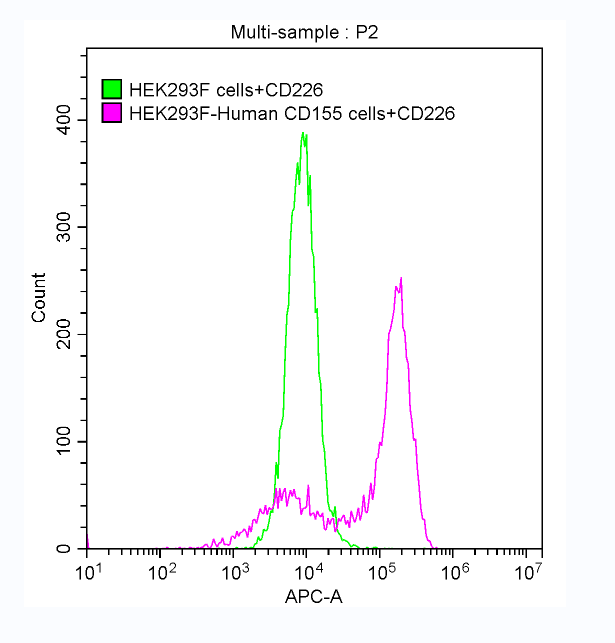
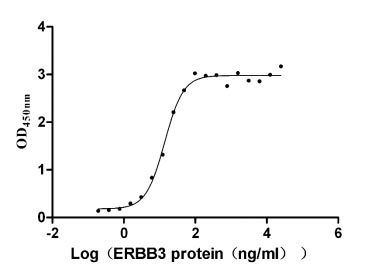
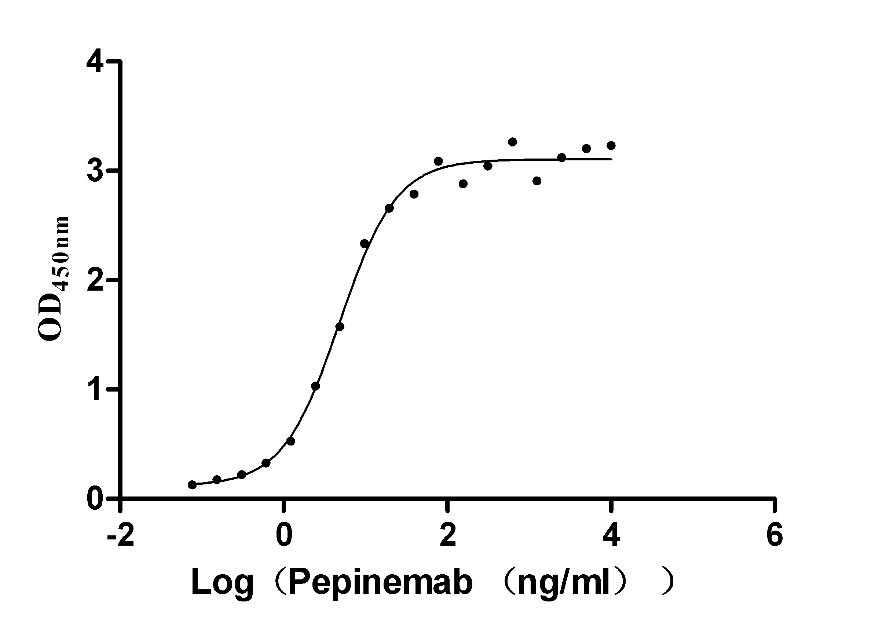
-AC1.jpg)
